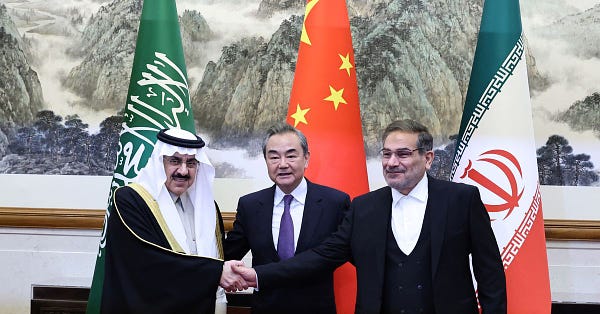China Brokers Historic Deal Between Saudi Arabia And Iran – What That Means For U.S. Interests
· By issuing a Joint Trilateral Statement by the Kingdom of Saudi Arabia, the Islamic Republic of Iran, and the People’s Republic of China, the Saudi Foreign Ministry is telling us that normalizing Arab-Israel relations has been canceled and Iran has a green light to develop deliverable nuclear weapons.
· Rapprochement between the Middle East superpowers, Iran and Saudi Arabia, will adversely affect events in Lebanon, Syria, and Iraq, though it may moderate the war in Yemen.
· In the ongoing existential struggle between the United States and China, the Saudi-Iran deal will increase China’s influence on energy assets in the Middle East, on current regional conflicts, and therefore the correlation of forces.
China cemented this historic deal with Iran and Saudi Arabia, the day after House Speaker McCarthy told Fox Business that we should make China “dependent on our natural gas.”
Among other things he mentioned in support of the Lower Energy Costs Act bill (HR1), House Speaker McCarthy told Fox Business host Larry Kudlow on Thursday that “We should make China dependent on our natural gas.” The day after that, China cemented its relationship with Iran and Saudi Arabia by brokering their astounding agreement to restore diplomatic relations. Besides insuring access to all the oil and natural gas that China could possibly use, the restored entente between Iran and Saudi Arabia has profound implications for the United States, Israel, and peace in the Middle East.
Not the least of these implications is the impending death of the Abraham Accords, Trump-era agreements based on the belief of Christians, Jews, and Moslems that Abraham was a common patriarch. Signatories to what amounts to a peace pact with Israel now include the UAE, Bahrain, Morocco, and Sudan (with some reservations still being negotiated.) It was widely hoped that American allies like Oman and Saudi Arabia would join the normalization process and ultimately bring peace to the Middle East. The normalization of relations with Iran and the Biden administration’s foreign policy put an end to those happy prospects. The only positive result of Saudi Arabia restoring relations with Iran is that Tehran may decide to reduce its support of the Houthi rebellion in Yemen. However, the control of Lebanon by Hezbollah, an Iranian proxy, will continue to grow as will the reconstruction of Iraq as an Iranian ally.
Syria is on Iran’s agenda too. The day before the Saudi-Iran deal was announced the Iranian foreign minister, Hossein Amir-Abdollahian, was in Damascus reassuring Bashar al-Assad of the Arab world’s outreach to internationally isolated Syria. He undoubtedly also discussed Turkey’s desire for resumed economic relations with Saudi Arabia, a lever that his new Saudi partners can pull in exchange for Turkey ending support of the Syrian rebels. Chinese interests are in the wings of these conflicts, but after brokering the Saudi-Iran deal whatever they are, they will not be ignored
How did the Biden administration manage to so quickly destroy the pillar of American prestige in the Middle East, a pillar founded on American lives and treasure lost in conflicts from Iraq to Afghanistan? What are the missteps in the last two years that lead to China’s invitation to broker the Saudi-Iran Deal -- instead of the United States?
First, we know that Mohammed bin Salman, the Saudi Crown Prince and de facto leader of Saudi Arabia, is a keen observer of American affairs. He also understands that ever since his great-grandfather King Abdulaziz met President Roosevelt on the U.S. Navy cruiser USS Quincy on the Great Bitter Lake on 14 February 1945, Saudi Arabia has been a staunch ally of the United States in exchange for American protection.
What changed the Prince’s mind? Did he notice the continuing penetration by China into American capital markets, siphoning off billions of dollars? Has he read reports of industrial espionage and bribery that have made China a preeminent technological superpower? Does he know about Hunter Biden’s laptop that shows Chinese bribery of the highest level of the United States government itself? Has he noticed the trillions of debt that have devalued the dollar, the currency in which oil is traded? Does he understand the debilitating effect of woke policies on American defense capabilities? Surely he has seen videos of civil unrest in American cities. And, like the rest of the Middle East, he saw the chaotic abandoning of Afghanistan and billions of dollars of military equipment after General Milley assured the world that the Afghan government was secure for at least two years.
Could all of these blunders convinced the Crown Prince that the United States was no longer the regional “strong horse” that his great-grandfather relied upon?
Finally, Saudi Arabia has promised that “if Iran gets nuclear weapons, then Saudi Arabia will get nuclear weapons.” It was generally assumed that the Saudis could and would obtain them from Pakistan. Does the new deal with Iran mean that Riyadh will get them from Iran itself? What is certain is that with the support of China and Saudi Arabia the Iran nuclear program, only weeks away from building a nuclear warhead, will proceed uninhibited.
Labeled as “The Great Satan” and the “Little Satan,” the United States and Israel should be alarmed by the tripartite Saudi-Iran deal. Israel is very alarmed.
The Biden White House, not so much.






Isn't it incomprehensible how much destruction the Biden Administration has done to the United States in just over two years? We will have no friends and allies by the time the next Presidential election arrives. We will be lucky we are not in a world war by that time!